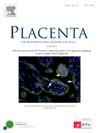Hyperglycemia-induced α-Klotho downregulation impairs mitophagy and promotes placental dysfunction in T2DM pregnancies
IF 3
2区 医学
Q2 DEVELOPMENTAL BIOLOGY
引用次数: 0
Abstract
Introduction
Placental dysfunction in pregnancies complicated by type 2 diabetes mellitus (T2DM) is associated with adverse maternal and fetal outcomes. α-Klotho, a multifunctional anti-aging protein, plays a critical role in maintaining cellular homeostasis, but its role in T2DM-induced placental dysfunction remains poorly understood.
Methods
Placental tissues from T2DM pregnancies and normoglycemic controls were analyzed for α-Klotho expression using qRT-PCR, Western blot, and immunohistochemistry. BeWo trophoblast cells were cultured under normoglycemic and hyperglycemic conditions, with α-Klotho knockdown and overexpression to explore its regulatory effects. Transcriptomic analysis was conducted to identify affected pathways, and markers of mitophagy and reactive oxygen species (ROS) were analyzed.
Results
α-Klotho expression was significantly reduced in the placentas of T2DM pregnancies and in trophoblast cells under hyperglycemic conditions. Transcriptomic analysis identified pathways related to mitochondrial dysfunction and impaired mitophagy as key processes regulated by α-Klotho. Hyperglycemia and α-Klotho knockdown suppressed mitophagy, while ROS production was increased, further exacerbating oxidative stress. Overexpression of α-Klotho restored mitophagy and mitigated ROS activation.
Discussion
This study reveals that α-Klotho downregulation contributes to T2DM-induced placental dysfunction by impairing mitophagy and increasing oxidative stress. These findings provide new insights into the molecular mechanisms underlying placental abnormalities in diabetic pregnancies and highlight α-Klotho as a potential therapeutic target.
高血糖诱导的α-Klotho下调损害T2DM妊娠的线粒体自噬并促进胎盘功能障碍
妊娠合并2型糖尿病(T2DM)的胎盘功能障碍与不良的母胎结局相关。α-Klotho是一种多功能抗衰老蛋白,在维持细胞稳态中起关键作用,但其在t2dm诱导的胎盘功能障碍中的作用尚不清楚。方法采用qRT-PCR、Western blot、免疫组化等方法分析T2DM孕妇和正常血糖对照组胎盘组织中α-Klotho的表达。在正常血糖和高血糖条件下培养BeWo滋养细胞,下调α-Klotho并过表达,探讨其调控作用。通过转录组学分析确定受影响的途径,并对线粒体自噬和活性氧(ROS)标志物进行分析。结果α- klotho在T2DM妊娠胎盘及高血糖状态下滋养细胞中的表达明显降低。转录组学分析发现与线粒体功能障碍和线粒体自噬受损相关的途径是α-Klotho调节的关键过程。高血糖和α-Klotho敲低抑制了线粒体自噬,而ROS的产生增加,进一步加剧了氧化应激。过表达α-Klotho恢复有丝分裂,减轻ROS激活。本研究揭示α-Klotho下调通过损害线粒体自噬和增加氧化应激参与t2dm诱导的胎盘功能障碍。这些发现为糖尿病妊娠胎盘异常的分子机制提供了新的见解,并突出了α-Klotho作为潜在的治疗靶点。
本文章由计算机程序翻译,如有差异,请以英文原文为准。
求助全文
约1分钟内获得全文
求助全文
来源期刊

Placenta
医学-发育生物学
CiteScore
6.30
自引率
10.50%
发文量
391
审稿时长
78 days
期刊介绍:
Placenta publishes high-quality original articles and invited topical reviews on all aspects of human and animal placentation, and the interactions between the mother, the placenta and fetal development. Topics covered include evolution, development, genetics and epigenetics, stem cells, metabolism, transport, immunology, pathology, pharmacology, cell and molecular biology, and developmental programming. The Editors welcome studies on implantation and the endometrium, comparative placentation, the uterine and umbilical circulations, the relationship between fetal and placental development, clinical aspects of altered placental development or function, the placental membranes, the influence of paternal factors on placental development or function, and the assessment of biomarkers of placental disorders.
 求助内容:
求助内容: 应助结果提醒方式:
应助结果提醒方式:


